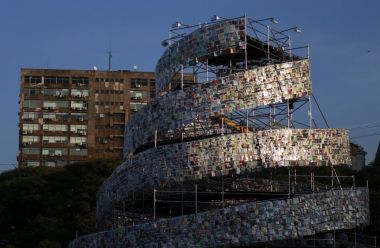The Tower of Babel: How the Genesis story speaks to the Church today

Look at most pictorial representations of the Tower of Babel and the chances are that you'll see a tower: a cylindrical structure, possibly looking a bit shaky and obviously destined to topple before long.
That may not be quite right, the wise biblical scholars say. What we might have been intended to imagine was a ziggurat, an enormous stepped pyramid used in the worship of ancient Mesopotamia, where the tale originated.
Whatever its shape, the tower has caught people's imaginations down the centuries. The idea of a mighty enterprise that's brought to a sudden halt because of the pride and ambition of the builders resonates with us. It's like Icarus flying too close to the sun: pride goes before a fall.
It's one of a series in Genesis 1-11 that deal with the deep things of how human beings have fallen away from God's intention for them. Many regard these stories – which include Cain and Abel and Noah's Ark – as literally and historically true. Others – and I'm one of them - see them as parables, told to convey spiritual truths vividly and dramatically.
However we approach Babel, though, the lessons we draw are going to be similar. The picture is of humanity united by "one language and a common speech". In a great communal effort they decide to build a city with a tower that reaches to the heavens: "otherwise we will be scattered over the face of the whole earth" (verse 4).
Their undertaking, however, does not meet with divine approval. If they can do this, God thinks, they can do anything. So he confuses their language ('Babel' sounds like the Hebrew word for 'confused' – we'd say 'babble') to make it impossible for them to cooperate any more, and the enterprise fails.
But what was so bad about building a tower?
The tower isn't the point: it's what people are capable of if they work together that matters.
We think of cooperation as a good thing. If only the barriers that separate people could be broken down, the world would be a better place.
But that depends on the people. Cooperation has led to enormous human progress. It's also led to huge evils. Working together, scientists built the moon rocket. Working together, scientists built the atom bomb too. Working together, scientists are curing cancer. Working together, corporations are cutting down rain forests to plant palm oil. Cooperation gives us the ability to achieve far more than we ever could alone, or in small groups. But it also multiplies our ability to do harm.
In the Genesis chronology, those who attempted to build the Tower of Babel were descended from Noah. It was supposed to be a fresh start, with the slate wiped clean: the bad people had gone and left no descendants, and everything was going to be fine.
It didn't work out that way. Noah was a drunkard who ended up cursing his own son. And sin can't be wiped out through a breeding programme: it's a spiritual problem, not a genetic one.
Giving great powers to people who didn't have the spiritual capacity to use them in the right way would have been disastrous. So God "confused the language of the whole world" and scattered them far and wide.
In the New Testament, though, there's a wonderful picture of restoration. In Acts 2:1-13 is the description of the coming of the Holy Spirit at Pentecost. The disciples "began to speak in other tongues as the Spirit enabled them". People from across the Roman Empire, speaking different languages, were all able to understand them.
The babble of Babel had been replaced by the harmony of Pentecost. There was no fear that "nothing they plan to do would be impossible for them" (Genesis 11:6). Instead, a new community, filled with the Spirit and empowered with the love of Christ, speaking one common language of faith, love and hope, would spread throughout the whole world with the message of the gospel.
And it would build a tower up to heaven: the Church would be the witness to Christ and a point of access to God the Father through him.
Babel marked human failure, because people couldn't be trusted to build something worth building. But we're people of Pentecost, brought together and blessed, and given a mandate to renew the world.
Follow @RevMarkWoods











